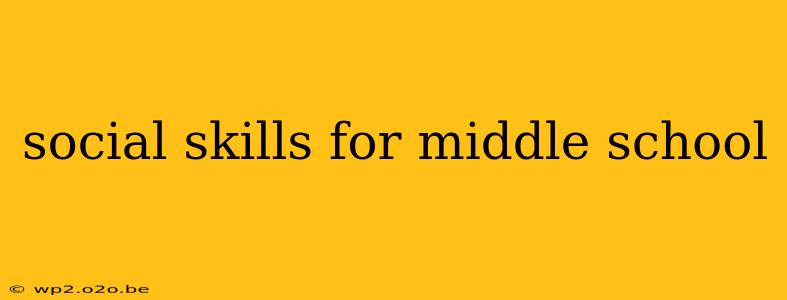Middle school. The very words conjure images of awkward hallways, shifting friendships, and the constant pressure to fit in. For young adolescents, navigating this turbulent social landscape can feel like traversing a minefield. Developing strong social skills is crucial not only for popularity but also for overall well-being and academic success. This guide delves into the essential social skills middle schoolers need to thrive.
Understanding the Unique Challenges of Middle School
Middle school marks a significant developmental leap. Hormones surge, bodies change, and the desire for independence intensifies. These internal shifts often manifest externally as mood swings, increased conflict with parents, and a heightened sensitivity to peer pressure. Understanding these developmental factors is key to supporting middle schoolers in building their social skills.
The Shifting Sands of Friendship
Friendships in middle school are often fluid and complex. Cliques form and dissolve, and peer acceptance becomes paramount. This can lead to feelings of exclusion, anxiety, and even depression if a child struggles to navigate these dynamics. Developing skills in:
- Communication: Clearly expressing needs and feelings, actively listening to others, and resolving conflicts constructively.
- Empathy: Understanding and sharing the feelings of others, showing compassion and support.
- Cooperation: Working effectively with others towards a common goal, compromising and sharing responsibilities.
are vital for building and maintaining healthy friendships.
Practical Social Skills for Middle Schoolers
Beyond the broader social-emotional skills, there are specific practical skills that middle schoolers can learn to enhance their social interactions:
1. Initiating Conversations: Breaking the Ice
Many middle schoolers struggle to initiate conversations. Teaching them simple icebreakers, such as commenting on shared classes, activities, or current events, can significantly boost their confidence and social interactions. Encouraging them to ask open-ended questions ("What did you think of the test?" rather than "Did you like the test?") promotes deeper engagement.
2. Active Listening: More Than Just Hearing
Active listening goes beyond simply hearing words; it involves paying attention to body language, asking clarifying questions, and showing genuine interest. Practicing active listening helps build stronger connections and fosters understanding, preventing misunderstandings and conflicts.
3. Handling Conflict: Resolving Disputes Peacefully
Disagreements are inevitable. Equipping middle schoolers with conflict resolution skills, such as using "I" statements to express feelings without blaming, actively listening to the other person's perspective, and finding mutually agreeable solutions, is essential for healthy relationships.
4. Assertiveness: Expressing Needs Respectfully
Assertiveness is about expressing one's needs and opinions respectfully without being aggressive or passive. Teaching middle schoolers how to say "no" politely, set boundaries, and stand up for themselves while respecting others is crucial for their self-esteem and overall well-being.
5. Nonverbal Communication: Reading the Room
Body language, facial expressions, and tone of voice often communicate more than words. Helping middle schoolers understand and interpret nonverbal cues can improve their social interactions and help them avoid misunderstandings. Conversely, being mindful of their own nonverbal communication can help them present themselves effectively.
Supporting Middle Schoolers: A Collaborative Effort
Developing strong social skills is an ongoing process requiring a collaborative effort between parents, teachers, and the students themselves. Open communication, consistent reinforcement of positive behaviors, and a supportive environment are crucial for fostering social-emotional growth.
This process may involve seeking professional guidance if a child is experiencing significant social challenges or signs of social anxiety or depression. Early intervention can make a world of difference.
Conclusion: Setting the Stage for Future Success
Mastering social skills in middle school lays the foundation for healthy relationships, academic success, and overall well-being throughout life. By focusing on these key skills and providing ongoing support, parents and educators can empower middle schoolers to navigate the complexities of adolescence with confidence and resilience.

